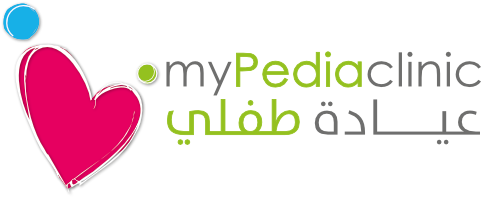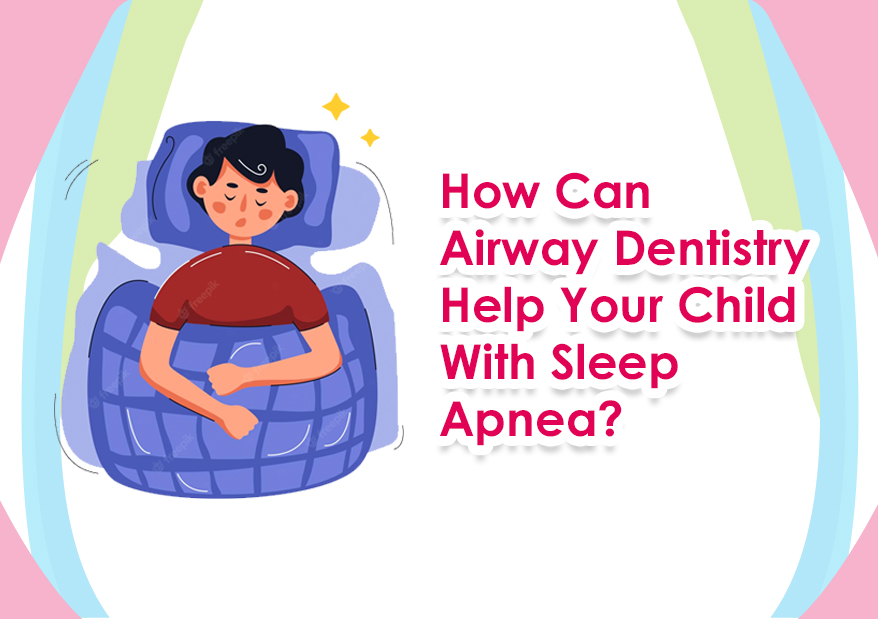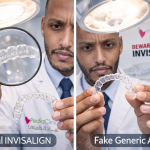Airway Dentistry for Kids: Can It Cure Your Child’s Sleep Apnea?
Your child snores loudly every night. They toss and turn, sometimes gasping for air. In the morning, they’re exhausted, cranky, and have trouble focusing at school. Sound familiar?
What if the solution to your child’s sleep problems wasn’t a sleep specialist or medication—but a dentist? This is where airway dentistry comes in, a growing field that addresses breathing and sleep problems by treating the root cause: the structure of the mouth and jaw.
At myPediaClinic in Dubai, our pediatric dentists work alongside our pediatricians to identify and treat airway issues in children. This guide explains what airway dentistry is, how it can help your child, and when to consider it.
What Is Airway Dentistry?
Airway dentistry (also called airway-focused dentistry or dental sleep medicine) is an approach that recognizes the connection between the mouth, jaw, and airway. Instead of just straightening teeth for aesthetics, airway dentists look at how the size and shape of the mouth affects breathing—especially during sleep.
The basic principle: a well-developed jaw and palate create space for the tongue and allow for proper nasal breathing. When the jaw is narrow or the palate is high and narrow, the airway can be compromised, leading to:
- Mouth breathing
- Snoring
- Obstructive sleep apnea (OSA)
- Poor sleep quality
Airway dentistry aims to expand the jaw and guide facial development to create more room for the tongue and open up the airway.
Understanding Sleep Apnea in Children
Sleep apnea is a serious condition where breathing repeatedly stops and starts during sleep. In children, it’s often caused by enlarged tonsils and adenoids—but structural issues in the mouth play a significant role too.
Signs of Sleep Apnea in Children
- Snoring: Loud, regular snoring (not just when sick)
- Pauses in breathing: Gasping or choking sounds during sleep
- Restless sleep: Thrashing, frequent position changes, sweating
- Mouth breathing: Sleeping with mouth open
- Bedwetting: In children who were previously dry at night
- Morning headaches: Due to reduced oxygen during sleep
- Daytime sleepiness: Unusual tiredness despite adequate sleep time
- Behavior problems: Hyperactivity, irritability, difficulty concentrating
- Poor school performance: Difficulty focusing and learning
Why Sleep Apnea Is Serious
Untreated sleep apnea in children can lead to:
- Growth problems (growth hormone is released during deep sleep)
- Behavioral issues often misdiagnosed as ADHD
- Learning difficulties
- Heart strain
- Failure to thrive
How the Mouth Affects Breathing
Your child’s airway starts at the nose and mouth. The size and shape of oral structures directly impact airflow:
The Palate (Roof of the Mouth)
A wide, flat palate provides plenty of room for the tongue. A high, narrow palate (common in mouth breathers) pushes the tongue backward, crowding the airway.
The Jaw
A well-developed lower jaw positions the tongue forward, away from the throat. A recessed or underdeveloped jaw allows the tongue to fall back during sleep, blocking airflow.
The Tongue
Proper tongue posture (resting against the roof of the mouth) helps maintain an open airway. When the mouth is narrow or the tongue is restricted (tongue tie), the tongue can’t assume this position.
The Teeth
Crowded teeth often indicate a narrow jaw. While braces can straighten teeth, they don’t always address the underlying airway issue.
How Airway Dentistry Helps Children
Airway dentistry takes a different approach than traditional orthodontics. Instead of waiting until all permanent teeth are in, airway-focused treatment often begins earlier—while facial bones are still developing and easier to guide.
Palatal Expansion
A palatal expander is a device that gradually widens the upper jaw. In children, the palate hasn’t fully fused, making expansion possible without surgery. Benefits include:
- More room for the tongue
- Improved nasal breathing (the palate forms the floor of the nasal cavity)
- More space for permanent teeth to come in straight
- Better airway during sleep
Myofunctional Therapy
This is “physical therapy” for the mouth. Exercises strengthen the tongue and facial muscles, promote proper tongue posture, and encourage nasal breathing. It’s often used alongside appliances.
Growth Guidance Appliances
Various dental appliances can guide jaw growth in the right direction:
- Myobrace: A series of removable appliances that train proper muscle function
- ALF (Advanced Lightwire Functional): A gentle wire appliance that encourages natural jaw development
- Twin Block: Helps bring the lower jaw forward
- Herbst appliance: Corrects overbite while improving airway
Tongue Tie Release
If a restricted tongue (tongue tie) is affecting tongue posture and breathing, a frenectomy may be recommended to release the tongue and allow proper function.
Airway Dentistry vs. Traditional Orthodontics
Here’s how airway-focused treatment differs from conventional orthodontics:
| Aspect | Traditional Orthodontics | Airway Dentistry |
|---|---|---|
| Primary goal | Straight teeth, good bite | Open airway, proper breathing, then straight teeth |
| Timing | Often waits until age 12+ | Early intervention (age 4-9) |
| Approach | May extract teeth to create space | Expands jaw to create space without extraction |
| Focus | Teeth alignment | Facial development, breathing, sleep |
| Considers airway? | Not always | Central to treatment |
Both approaches have their place. Some children benefit from airway-focused early treatment followed by traditional braces to fine-tune alignment.
Who Can Benefit from Airway Dentistry?
Airway dentistry may help children who have:
- Sleep apnea or sleep-disordered breathing
- Chronic snoring
- Mouth breathing
- Crowded teeth or narrow palate
- Recessed chin or underdeveloped jaw
- Tongue tie
- Speech problems
- Difficulty with attention and behavior (potentially related to poor sleep)
- Chronic allergies or nasal congestion
- Bedwetting
What to Expect During Treatment
Airway-focused dental treatment typically involves:
Comprehensive Evaluation
The dentist will assess your child’s:
- Dental and facial development
- Breathing patterns
- Tongue posture and function
- Tonsil and adenoid size
- Sleep history
Additional tests may include X-rays, photos, and possibly a sleep study.
Personalized Treatment Plan
Based on findings, a customized plan is developed. This might include:
- Palatal expander or other appliance
- Myofunctional therapy exercises
- Referral for adenoid/tonsil evaluation if needed
- Tongue tie release if indicated
Active Treatment Phase
Treatment duration varies but typically ranges from 6 months to 2 years. Children wear appliances as directed (some are full-time, others are nighttime only) and practice exercises.
Follow-up and Monitoring
Regular appointments monitor progress. As your child grows, adjustments are made to guide development optimally.
Benefits of Early Intervention
Why not wait until your child is older for orthodontics? Early airway-focused treatment offers unique advantages:
- Bones are more moldable: Facial bones are still developing in young children, making them easier to guide without surgery.
- Prevents worsening: Untreated airway problems affect ongoing facial development.
- Improves sleep now: Better breathing means better sleep during critical growth years.
- Supports brain development: Quality sleep is essential for learning and memory.
- May reduce need for extensive orthodontics later: Guiding jaw growth early can create space for teeth naturally.
- Addresses root cause: Treating the underlying structure, not just the symptoms.
Questions to Ask Your Dentist
If you’re considering airway dentistry for your child, ask:
- Do you evaluate the airway as part of dental exams?
- What training do you have in airway-focused dentistry?
- How do you assess breathing and sleep issues?
- What treatment options do you recommend for my child?
- Do you work with ENTs, sleep specialists, and myofunctional therapists?
- What results can we expect?
Frequently Asked Questions About Airway Dentistry
What age is best to start airway dentistry treatment?
Early intervention typically begins between ages 4-9, when facial bones are still developing and more responsive to treatment. However, airway issues can be addressed at any age with appropriate methods.
Does insurance cover airway dentistry?
Coverage varies. Some treatments may be covered under orthodontic benefits; others may require medical justification (such as sleep apnea diagnosis). Check with your insurance provider and ask the dental office about financing options.
Is palatal expansion painful?
Children typically feel pressure when the expander is activated, but not pain. Any discomfort is usually mild and temporary. Most children adjust to the device within a few days.
Can airway dentistry cure sleep apnea?
Airway dentistry can significantly improve or resolve sleep apnea in many children by addressing structural causes. Results depend on individual factors. Severe cases may also need adenoid/tonsil removal.
Will my child still need braces after airway treatment?
Some children need traditional braces after airway-focused treatment to fine-tune tooth alignment. However, the orthodontic treatment is often simpler and shorter because the jaw has been properly developed.
How is airway dentistry different from regular orthodontics?
Traditional orthodontics focuses primarily on straightening teeth. Airway dentistry prioritizes proper breathing and jaw development, with tooth alignment as a secondary benefit. The timing is also different—airway treatment often starts earlier.
Does my child need a sleep study first?
A sleep study isn’t always required but may be recommended if sleep apnea is suspected. It provides objective data about breathing during sleep and helps measure treatment success.
How long does treatment take?
Treatment duration varies based on the child’s age, severity of the problem, and specific treatment plan. Active treatment typically lasts 6-24 months, with monitoring continuing as the child grows.
Can airway dentistry help with ADHD symptoms?
Many symptoms of ADHD—hyperactivity, poor concentration, impulsivity—can result from poor sleep. If your child’s behavioral issues are related to sleep-disordered breathing, improving their airway may significantly improve their behavior and focus.
What if my child won’t wear the appliance?
Compliance is important for success. Choose a provider experienced with children who can make treatment as comfortable as possible. Myofunctional therapy exercises and positive reinforcement also help.
Getting Started with Airway Dentistry in Dubai
If your child snores, breathes through their mouth, has crowded teeth, or struggles with sleep, an airway evaluation could reveal underlying issues affecting their health and development.
At myPediaClinic, our pediatric dental team works alongside our pediatricians to take a comprehensive approach to your child’s health—including their breathing and sleep. We believe that healthy airways lead to healthier kids.
Book an appointment for an airway evaluation today.





